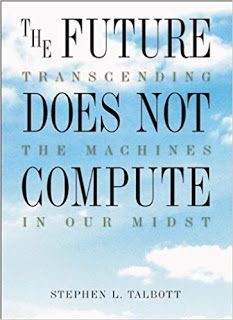
Dense yet elegantly lucid, Stephen L. Talbott’s The Future Does Not Compute: Transcending the Machines in Our Midst was published by O’Reilly Associates in 1995, on the eve of the explosion of email, well before that of social media. Astonishingly, it delineates the nature of our now King Kong-sized challenges with technology, when those challenges were, so it now seems, but embryonic. And Talbott writes with unusual authority, grounded in both philosophy and his many years of writing and editing for O’Reilly Media, a prime mover in the economic / cultural juggernaut of a complex, increasingly dispersed from its origin in California’s Santa Clara Valley, that has become known as “Silicon Valley.”
> Talbott offers the entire text of The Future Does Not Compute for free on his website at this link, along with an annotated table of contents. You can also find a paperback edition from your go-to online bookseller.
From the catalog copy:
“Many pundits tell you that the computer is ushering us toward a new Golden Age of Information. A few tell you that the computer is destroying everything worthwhile in our culture. But almost no one tells you what Stephen L. Talbott shows in this surprising book: the intelligent machine gathers its menacing powers from hidden places within you and me. It does so, that is, as long as we gaze into our screens and tap on our keyboards while less than fully conscious of the subtle influences passing through the interface…
“The Net is the most powerful invitation to remain asleep we have ever faced. Contrary to the usual view, it dwarfs television in its power to induce passivity, to scatter our minds, to destroy our imaginations, and to make us forget our humanity. And yet — for these very reasons — the Net may also be an opportunity to enter into our fullest humanity with a self-awareness never yet achieved. But few even seem aware of the challenge, and without awareness we will certainly fail.”
For me Talbott’s work was a wondrous but belated find, given my focus on the conundrums of technology in my book-in-progress on Far West Texas (which also, on few occasions, ranges as far west as Silicon Valley, for reasons which will be clear in the book itself).
Tops on my reading pile is Talbott’s more recent book (2007), Devices of the Soul: Battling for Ourselves in the Age of Machines.
> Visit Talbott’s home page and guide to his writings here.
> See also a 1999 New York Times article on Talbott’s work, “Editor Explores Unintended, and Negative Side of Technology.”
NOTES ON TALBOTT’S THE FUTURE DOES NOT COMPUTE
–BUT FIRST, OWEN BARFIELD
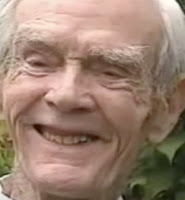
In his acknowledgements Talbott writes that he is “indebted above all to a man I have met only though his published writings: Owen Barfield.” Barfield (1898-1987) was an English philosopher, author of Worlds Apart and Saving the Appearances, among many other works, and part of the Oxford literary circle that included C.S. Lewis and J.R. R. Tolkein. Writes Talbott:
“The core insights underlying all [Barfield’s] work remain among the most original scholarly achievements of this century. So original, in fact, that these insights are impossible to accept– even impossible to think.”
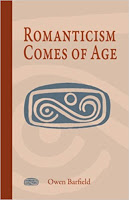
> See Owen Barfield’s official webpage, main quote: “Our destiny is to become conscious and free.”
> Timeline of Barfield’s friendship with C.S. Lewis
> See Worlds Apart by Owen Barfield
> See Saving the Appearances by Owen Barfield
> See link to a short documentary, “Owen Barfield: Man and Meaning”
Notes on that: Barfield is mainly about “thinking about thinking.” His key work is Saving the Appearances.
> See the authorized biography by fellow Anthroposophist Simon Blaxland-de Lange, Owen Barfield: Romanticism Comes of Age: A Biography.
> See also the collection by Owen Barfield with the same title, Romanticism Comes of Age, essays on Coleridge, Goethe, Steiner and Anthroposophy.
RE: RUDOLF STEINER, NOTES AND LINKS
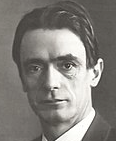
An important influence on Owen Barfield was the work of Austrian mystic Rudolf Steiner (1861-1925), most notably his book The Philosophy of Freedom. When he found Steiner’s works, Barfield had already independently come to many similar conclusions. In the documentary on Barfield cited above, “it was a case of like finding like.”
See the page on Rudolf Steiner here and an archive of his works here.
Caveat: Reading Steiner can get very strange very fast; not everyone has the stomach for reading about angelic channelings, epic battles in the supercelestial realms, etc. Steiner’s Anthroposophy is an offshoot of Theosophy, and as such, heavily influenced by many of the ideas of Russian mystic Madame Blavatsky. (Read a brief note about Madame Blavatsky, the monumental figure of modern esotercism, in the excerpt from my book about Francisco I. Madero here.)
But: keep your shoes on your feet and your helmet buckled onto your coconut! Steiner was, among many other things, the founder of the Waldorf Schools. Read about that influence in Silicon Valley here (New York Times) and here (Business Insider). There is also a video posted in 2013 by the Waldorf School of the Peninsula which explains the educational philosophy in some detail.
Of note re: Steiner’s broader cultural influence: Saul Bellow’s Humboldt’s Gift grapples with Steiner’s philosophy, Anthroposophy. For this novel Bellow won the Pulitzer Prize in 1976, the same year he also won the Nobel Prize for Literature. See Stephen E. Usher’s Conversations with Saul Bellow on Esoteric-Spiritual Matters: A Publisher’s Recollections.
(I’m focusing on computers here, so I won’t get into Steiner and Biodynamic Agriculture; do Google or Duckduckgo should you feel so moved. P.S. Wikipedia, aka wiki-whenever-whomever-whatever, is likely not your best source of information on this subject.)
> See Liz Attwell’s brief and concise video review of Steiner’s The Philosophy of Freedom. Quotes from Attwell’s review:
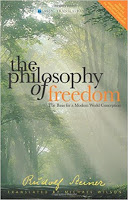
“[This is] the most radical book that Steiner wrote, it is the foundation of all his thought… I think it is the only book that would have convinced me he had something important… to say… he is removing the blinkers from the Western mindset. He clarifies the act of knowing… he brings it down to the simplest possible elements and he shows you where, in your thinking, it’s possible that you might be free. He shows you, there’s a self-contained place in your thinking where it’s absolutely clear that you could be free…. If you build from that place, you can be sure that what you are thinking and feeling and willing is coming from a place that is not being determined by anybody or anything else… we can begin to know ourselves in the world, and that would be the true basis of freedom.”
> See also the video of Christopher Bamford, publisher of Steiner Books USA, discussing Steiner’s The Philosophy of Freedom; and for a broader view of Steiner’s thought, see “Christopher Bamford Interviewed for ‘The Challenge of Rudolf Steiner.'” And see philosopher Jeremy Naydler, also interviewed for “The Challenge of Rudolph Steiner.”
BACK TO NOTES ON TALBOTT’S THE FUTURE DOES NOT COMPUTE
Talbott:
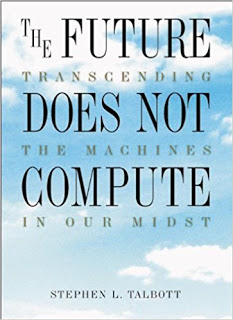
“During most of [the] seventeen years I was working with computers, and it slowly became clear to me that the central issues bedeviling all of us who try to understand the relation between the human being and the computer are issues upon which Barfield began throwing light some seven decades ago. The Future Does Not Compute is my attempt to reflect a little of that light toward the reader.”
Talbott on awareness of self and awareness of the nature of machines:
“Machines become a threat when they embody our limitations without our being fully aware of those limitations. All reason shouts at us to approach every aspect of the computer with the greatest caution and reserve. But what incentive has our culture provided for the exercise of such caution and reserve? It’s more in our nature to let technology lead where it will, and to celebrate that leading as progress.” Ch. 2 “The Machine in the Ghost”
“On the one hand: the machine as an expression of the human being. On the other hand: the machine as an independent force that acts or reacts upon us. Which is it? I am convinced there is no hope for understanding the role of technology in today’s world without our first learning to hold both sides of the truth in our minds, flexibly and simultaneously. The relationship between human being and machine has become something like a complex symbiosis.” Ch. 2 “The Machine in the Ghost”
“If it is only through self-awareness and inner adjustment that I can restrict the hammer in my hands to its proper role, I must multiply the effort a millionfold when dealing with a vasty more complex technology– one expression in a much more insistent manner its own urgencies.” Ch. 2 “The Machine in the Ghost”
“understanding is the basis of freedom.” Ch. 2 “The Machine in the Ghost”
“the computer, one might almost say, was invented as an inevitable refinement of the corporation” Ch. 3 “The Future Does Not Compute”
“what we have embodied in technology are our own habits of thought… The need is to raise these habits to full consciousness, and then take responsability for them.” Ch. 5 “On Being Responsible for Earth”
“another word for responsability is ‘dominion’– not the dominion of raw power, but of effective wisdom.” Ch. 5 “On Being Responsible for Earth”
“We can no longer stop or even redirect the engine of technological change by brute, external force. Such force is the principle of the engine itself, and only strengthens it. We must tame technology by rising above it and reclaiming what it not mechanical in ourselves.” Ch. 5 “On Being Responsible for Earth”
[Much of chapter 5 is taken up with a critique of the works of Jerry Mander. See Mander’s In the Absence of the Sacred: The Failure of Technology and the Survival of the Indian Nations and Four Arguments for the Elimination of Television. (For more on television: Marie Winn, The Plug-In Drug: Televisions, Computers, and Family Life).]
“But Mander does neglect one critical fact: what we have embodied in technology are our own habits of thought. Yes, our artifacts gain a life of their own, but it is, in a very real sense, our life. We too easily ignore the ways in which we infuse these artifacts with the finespun web of our own, largely subconscious habits of thought. The need is to raise these habits to full consciousness, and then take responsibility for them.
[Much of chapter 6 includes a scathing attack on George Gilder’s ideas.]
“…the more complex and indirect the mechanisms through which human action come into expression, the more you and I must be masters of ourselves.” Ch. 6 “Networks and Communities”
“…one way or another, you are creating your future. Wake up before you find that the devils within you have done the creating.” Ch. 6 “Networks and Communities”
“…the view that a technology can be ‘democratizing and leveling’ testifies to a radical alienation from everything that constitutes both the inner life and culture” Ch. 6 “Networks and Communities”
“…the telephone, automobile, radio, and television have all contributed to social fragmentation, personal isolation, and alienation from both self and other” Ch. 6 “Networks and Communities”
“What hope is there for peace and human rights when I conceive the barriers separating me from my fellows to be mere obstructions on a network technology diagram rather than the powers of darkness shadowing my own heart?” Ch. 6 “Networks and Communities”
On freedom and power:
“The need is to recognize ourselves in our machines, and our machines in ourselves, and begin to raise ourselves above our machines.” Ch. 7 “At the Fringe of Freedom”
“Freedom, you might say, is not a state, but a tension” Ch. 7 “At the Fringe of Freedom”
“The doing required of us is a refusal to continue seeing all problems as the result of a doing rather than a being, as technical rather than spiritual.” Ch. 7 “At the Fringe of Freedom”
“…if we persist in the cultivation of a purely technical stance toward our work and our technology, we will find that, like the corporation, it takes on a life of its own, which is at the same time, our life–but out of control and less than fully conscious… this autonomous life may exercise a totalitarian suppression of the human spirit that will be all the more powerful for its diffuseness and invisibility” Ch. 7 “At the Fringe of Freedom”
On the so-called “global village”:
“…could it be that what we so eagerly embrace, unawares, are the powers of dissolution themselves?” Ch. 9 “Do We Really Want a Global Village?”
“…what concerns me is the likelihood of our expressing within a new social and technological landscape the same spiritual vacuity that gave rise to the old tyrannies” Ch. 9 “Do We Really Want a Global Village?”
“The global village is… a technological creation. Many would-be village architects are inspired by te endless potentials they discern in a satellite dish planted among thatched roof houses. This techno-romantic image calls up visions of information sharing and cooperation, grassroots power, and utopian social change. What it ignores is the monolithic and violently assimilative character of the resulting cultural bridges.” Ch. 9 “Do We Really Want a Global Village?”
On awareness and loss:
“The light of mathematics may have descended into our minds from the circling stars, but how many students of mathematics still look to the night sky with wonder?” Ch. 9 “Do We Really Want a Global Village?”
On “helping” developing countries by bringing modern technology:
“the logic and assumptions of our technology can prove bitterly corrosive. Worse, the kind of community from which Western technical systems commonly arise is, for the most art, noncommunity–typified by the purely technical, one-dimenional, commercially motivated, and wholly rationalized environments of corporate research and development organizations.”
More:
“…human life can be sustained only within a sea of meaning, not a network of information” Ch. 9 “Do We Really Want a Global Village?”
Heavvvvy….
“…our rush to wire the world will some day be seen to have spawned a suffering as great as that caused by this century’s most ruthless dictators”
On the corporation (corporation as machine):
“Is the corporation a human activity in the service of human needs, or not? It is remarkble how easily and subtly the human-centered view slips from our grasp. Indeed, just so far as the corporation is viewed as an enterprise designed to score a profit, rather than to serve worthwhile ends under the discipline of economic controls, to that extent the entire organization has already been cut loose from its human justification and reduced to something like a computational machine” Ch. 10 “Thoughts on a Group Support System”
Nugget o’ wisdom:
“… every problem is a gift… [it] invites the production of new, human “capital.’ This is far different from seeing a problem merely as something to be gotten rid of by the most efficient means possible.” Ch. 10 “Thoughts on a Group Support System”
Essence:
“It’s not the Net we’re talking about here; it’s you and me. And surely that’s the only place to begin. Neither liberation nor oppression can become living powers in any soil except that of the human heart” Ch 11
Yep:
“If we experience our machines as increasingly humanlike, then we are experiencing ourselves as increasingly machinelike.” Ch 11
“…we are strongly tempted to use our freedom in order to deny freedom, pursuing instead the mechanization of life and thought” Ch 11
“… what is directly at risk now–what the computer asks us to abdicate– are our independent powers of awareness. Yet these powers are the only means by which we can raise ourselves above the machine” Ch 11
“What if the human being to whom we so beautifully adapt the computer is the wrong sort of human being? What if our efforts really amount to a more effective adaptation of the human being to the machine, rather than the other way around?” Ch 11
“…we have learned to regard ourselves as ghosts in the machine… we have more and more become mere ghosts in the machine” Ch 11
Quotable:
“an electronic New Jerusalem, its streets paved with silicon” Ch. 24 “Electronic Mysticism”
More to ponder:
“ancient man, much more than we, experienced himself rather like an like an embryo within a surrounding, nourishing cosmos… a plenum of wisdom and potency”
“the mythic surround was engaged in weaving the ancient mind, as in a dream”
“From Tolkein’s storyteller– who originates and remains one with his own mind– they have descended to mechanican tinkerer… just so far as we forget our ancient descent from a cosmos of wisdom above us– we lose the basis of creative mastery, an offer ourselves to be remade by the mechanisms below us”
“we are pursuing an experiment every bit as momentous as the discovery of mind at the dawning of western civilization– what manner of god will we be?”
> See also C.S. Lewis, The Discarded Image
Essential quote from Talbott’s The Future Does Not Compute:
“…what we have today is in some respects a seriously disabled consciousness, and… our own infatuation with machines is both a symptom of our disability and a further contributor to it.”

Q & A: Nancy Peacock, Author of The Life and Times of Persimmon Wilson, on Writing in the Whirl of the Digital Revolution
This Writer’s Distraction Free Smartphone (Plus an App Evaluation Flowchart to Tailor-Make Your Own)
From the B. Traven Conferences in Berlin, Plus Cyberflanerie
Visit my website for more about my books, articles, and podcasts.


